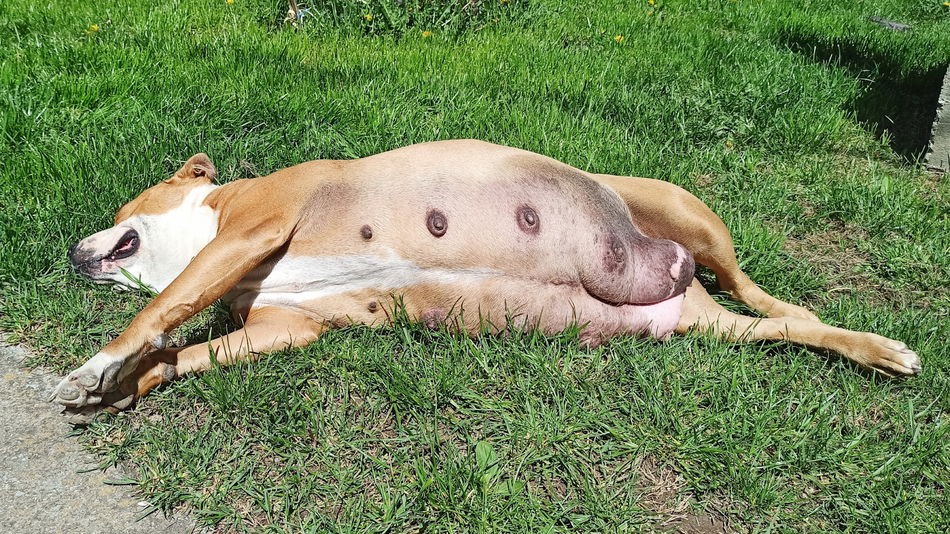Having your dog go through heat can leave you with questions, especially if you notice changes in her body. One common concern is swollen nipples after heat. While some nipple enlargement is normal, it’s crucial to understand what’s typical and when to seek veterinary attention. This article will explore the common reasons why your dog’s nipples might be swollen after heat.
Hormonal fluctuations during a heat cycle often cause a dog’s mammary glands to swell, leading to enlarged nipples. This is usually temporary and resolves on its own. However, persistent swelling can indicate underlying health conditions requiring veterinary care.
Common Causes of Swollen Nipples in Dogs After Heat
Several factors can contribute to swollen nipples in dogs after their heat cycle:
Hormonal Changes During Heat
A dog’s estrogen and progesterone levels fluctuate significantly during heat, preparing the body for potential pregnancy. These hormonal shifts can enlarge the milk-producing cells in the mammary glands, resulting in nipple swelling. This is a natural physiological response and usually subsides within a few weeks.
Pregnancy
If your dog mated during her heat cycle, pregnancy is the most likely cause of swollen nipples. Nipple enlargement and color changes are early signs of pregnancy, typically appearing around three weeks after conception.
False Pregnancy (Pseudopregnancy)
Even without mating, some dogs experience a false pregnancy, or pseudopregnancy. This condition mimics pregnancy symptoms, including swollen nipples, due to hormonal imbalances. Other signs may include fluid retention, nesting behavior, and even milk production.
Mastitis
Mastitis is an inflammation or infection of the mammary glands, often occurring after heat due to hormonal changes that make the glands more susceptible to infection. Swollen, painful nipples, along with redness and discharge, are common symptoms of mastitis.
Mammary Tumors
Although less common, mammary tumors can cause nipple enlargement. These tumors can develop in both intact and spayed females, but the risk is significantly higher in unspayed dogs. Spaying your dog greatly reduces the risk of mammary cancer.
Mammary Gland Hyperplasia
This condition involves the excessive growth of mammary gland tissue, leading to enlarged nipples. Hormonal imbalances are usually the underlying cause. While often benign, mammary gland hyperplasia can sometimes resemble tumors.
Infections or Abscesses
Bacterial infections in the mammary glands can cause inflammation and swelling, resulting in enlarged nipples. These infections require veterinary treatment to prevent complications.
Trauma or Injury
Injury to the mammary glands or surrounding tissue can lead to localized inflammation and nipple enlargement.
Medication Side Effects
Certain medications, particularly hormone-based treatments, can cause nipple enlargement as a side effect.
Understanding the Canine Heat Cycle and Nipple Changes
The canine heat cycle, or estrous cycle, consists of four stages: proestrus, estrus, diestrus, and anestrus. Each stage has distinct hormonal changes that affect the nipples:
-
Proestrus: Nipples may become slightly enlarged and more prominent.
-
Estrus: This is the mating period, and nipple enlargement may become more pronounced.
-
Diestrus: Nipples gradually return to their normal size and color.
-
Anestrus: The reproductive system is inactive, and nipples should appear normal.
When to See a Vet
If your dog’s nipples remain swollen for more than a few weeks after heat, or if you notice any other concerning symptoms like pain, redness, discharge, or lumps, consult your veterinarian. Early diagnosis and treatment are crucial for managing any underlying health issues.
Conclusion
Swollen nipples after heat can be a normal hormonal response, but they can also signal more serious conditions. Monitoring your dog’s health, understanding her heat cycle, and seeking timely veterinary care are essential for ensuring her well-being.
